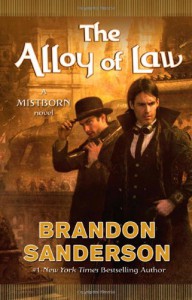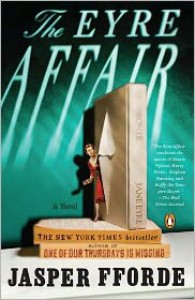30
Followers
2
Following
Nyssa's Reading Life
I like books. Well-written books, which generally excludes most YA (sorry, everybody). I edit literary fiction in my spare time, and I eat up books with great prose and no pretentiousness. I also love good speculative fiction and frequently read classics.
Currently reading
The Filter Bubble: What the Internet Is Hiding from You 1st (first) edition by Pariser, Eli published by Penguin Press HC, The (2011) [Hardcover]
Progress:
131/243 pages
The Alloy of Law (Mistborn Series #4)
 Though some serious Brandon Sanderson devotees might see this book as lighter and more inconsequential than his more epic-length books, it is by far the best written of all his books. He doesn't struggle with pacing issues at all here, and the story moves along at a fast clip. Sanderson creates solid characters here, and he refrains from much of his normal tics ("raised an eyebrow," "frowned," "snorted," etc.), substituting beats with complexity and characterization instead. It's fun to read, especially when you can make connections to the Mistborn world, and the last chapter hints at an excellent upcoming trilogy. Highly recommended, but only if you're already read the Mistborn trilogy.
Though some serious Brandon Sanderson devotees might see this book as lighter and more inconsequential than his more epic-length books, it is by far the best written of all his books. He doesn't struggle with pacing issues at all here, and the story moves along at a fast clip. Sanderson creates solid characters here, and he refrains from much of his normal tics ("raised an eyebrow," "frowned," "snorted," etc.), substituting beats with complexity and characterization instead. It's fun to read, especially when you can make connections to the Mistborn world, and the last chapter hints at an excellent upcoming trilogy. Highly recommended, but only if you're already read the Mistborn trilogy.
Swan House, The: A Novel
 Like many readers have already mentioned, the premise was more satisfying than the execution. The Swan House is set in Atlanta in the 1960s and purportedly examines the racial tensions in the city through the perspective of a teenage girl from a wealthy family. Mary Swan Middleton learns the errors of her prejudices through her service in inner-city Atlanta and also discovers a newly awakened Christian faith. A book with good intentions, but with major flaws.First of all, Musser loves to talk about the same subject at length--and when I say length, I mean about one hundred pages dedicated to the immediate aftermath of a plane crash in which the protagonist's mother was killed. Yes, that's a very sad event, but not one that I want to spend 25 percent of the book on. And the prose isn't very graceful: as one reviewer said, it sounds like the entire book was written by a sixteen-year-old girl. The book is overly preachy, and the detail about the boys that Mary Swan is interested in gets old fast. I couldn't sympathize with Mary Swan's torment about finding out more about her mother. It just didn't seem like a big deal to me at all, and so those moments of introspection seemed very indulgent.The book has a good heart, but it's pumping through some very shriveled veins. The prose is a disappointment to the premise, and the book does not have my recommendation.
Like many readers have already mentioned, the premise was more satisfying than the execution. The Swan House is set in Atlanta in the 1960s and purportedly examines the racial tensions in the city through the perspective of a teenage girl from a wealthy family. Mary Swan Middleton learns the errors of her prejudices through her service in inner-city Atlanta and also discovers a newly awakened Christian faith. A book with good intentions, but with major flaws.First of all, Musser loves to talk about the same subject at length--and when I say length, I mean about one hundred pages dedicated to the immediate aftermath of a plane crash in which the protagonist's mother was killed. Yes, that's a very sad event, but not one that I want to spend 25 percent of the book on. And the prose isn't very graceful: as one reviewer said, it sounds like the entire book was written by a sixteen-year-old girl. The book is overly preachy, and the detail about the boys that Mary Swan is interested in gets old fast. I couldn't sympathize with Mary Swan's torment about finding out more about her mother. It just didn't seem like a big deal to me at all, and so those moments of introspection seemed very indulgent.The book has a good heart, but it's pumping through some very shriveled veins. The prose is a disappointment to the premise, and the book does not have my recommendation.
Style: Lessons in Clarity and Grace
 I liked the advice in the first half of this book. Williams writes very directly about how to trim the fat from bloated prose. The second half wasn't as strong, though. It contains tips about how to keep an argument coherent, and for the most part, the tips here seem obvious, almost not worth writing about. I would recommend the first half to anyone trying to write more clearly, but the second half only to those who need serious writing help. Overall, a helpful read for my editing education.
I liked the advice in the first half of this book. Williams writes very directly about how to trim the fat from bloated prose. The second half wasn't as strong, though. It contains tips about how to keep an argument coherent, and for the most part, the tips here seem obvious, almost not worth writing about. I would recommend the first half to anyone trying to write more clearly, but the second half only to those who need serious writing help. Overall, a helpful read for my editing education.
The Public Domain: Enclosing the Commons of the Mind
 James Boyle retains a personable voice throughout the book if he sometimes dwells on some points longer than my layman's attention can focus on them. He introduces the reader not just to current intellectual property law but also to the more abstract notion of what it is we're trying to protect and what we're trying to remote through the use of copyrights and patents.One of the most interesting points that Boyle brings up is how, because of the low cost of copying in our society, the use of technology is falling more under the stranglehold of copyright. That idea alone should be enough to motivate people to read the book. You'll learn about intellectual property, yes, but you'll also start to realize its importance to our culture and why it's time to reform some of it.
James Boyle retains a personable voice throughout the book if he sometimes dwells on some points longer than my layman's attention can focus on them. He introduces the reader not just to current intellectual property law but also to the more abstract notion of what it is we're trying to protect and what we're trying to remote through the use of copyrights and patents.One of the most interesting points that Boyle brings up is how, because of the low cost of copying in our society, the use of technology is falling more under the stranglehold of copyright. That idea alone should be enough to motivate people to read the book. You'll learn about intellectual property, yes, but you'll also start to realize its importance to our culture and why it's time to reform some of it.

![The Filter Bubble: What the Internet Is Hiding from You 1st (first) edition by Pariser, Eli published by Penguin Press HC, The (2011) [Hardcover] -](http://booklikes.com/photo/max/50/80/upload/books/f/c/azure_fcb9ec8c27badfb8202e5a38971a1869.jpg)



